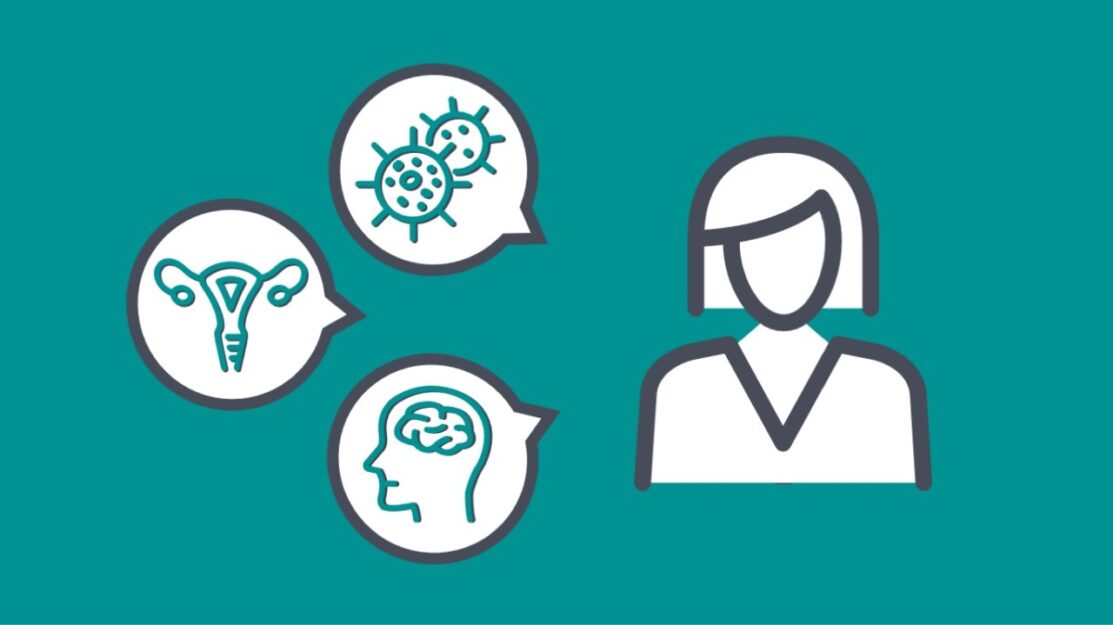By Shruthi Mahalingaiah:
Periods haven’t paused during the pandemic, and neither should conversations surrounding gynecologic care for people of all ages–including adolescents at the age of puberty.
Children, parents, guardians, and teachers navigated a challenging, immediate pivot to a virtual world when shelter-in-place orders were issued in 2020. Over the following months, schedules were destroyed, after-school activities suspended, and anxiety and agoraphobia seeped into the fabric of our daily lives.
These were immense stressors for the family unit, including for mine. My three daughters, 9-year-old twins and 11-year-old first-born, yearned for summer 2020 after what felt like an eternity indoors. Warmer weather made me feel more comfortable with playdates with our “pod” and returning to some semblance of normalcy. Over juicy burgers at a backyard, socially-distanced barbecue, my mom-friend turned to me and asked me to give an introduction to menstruation to our neighborhood girls.
The first occurrence of menstruation, known as menarche, typically occurs when a child is 12-13 years-old and can vary by race/ethnicity. Early menarche is associated with several risk factors, including stress, obesity, health conditions, and environmental endocrine disrupting exposures. Recent media coverage and narrative on social media notes trends in women reporting differences in their periods and symptoms during the pandemic. While we don’t fully understand changes in menstruation and the association with the pandemic, we have a small understanding of the lifestyle and environmental factors that impact menstruation. These factors impact people of all ages, including children.
Changes in the epidemiology of the first period during the pandemic didn’t become a personal reality until I got a call from my first-born child stating she got her period. I was on call at Mass General’s fertility clinic that fall weekend afternoon when she noticed brownish/red discharge that turned to bright red over the course of the day. With at-home work and learning the new norm, I thought that there would be a higher chance that I would be with my daughter to navigate this experience. Her dad navigated the menstrual product isle and brought back organic panty liners and pads from the pharmacy. She then sent me status updates, pad check by texted photo, and video-chatted me over the course of the day.
My daughter has since used paper and digital calendars to track her periods and is excited about learning how menstruation is linked to her overall health and wellness. Tracking menstrual cycles is an important tool to understand irregularity and to optimize health. While short-term cycle irregularity is not a reason for immediate concern, patterns of persistent irregularity can signal other health issues. I encourage my daughter to track and share the importance of it. Tracking does not always happen – kids will be kids – however, I try to support and recommend tracking particularly when there is concern for an irregular period pattern.
Vagina, period: these are all commons words in my household. American Girl’s The Care and Keeping of You has been read so many times that its seam is falling apart, and my daughter and I altered the lyrics to Ed Sheeran’s “Castle on the Hill” to be about menstruation: “I got my first period on a Friday night.” With menstruation and period blood continuing to be stigmatized in society, I know that this type of open conversation is not as common or as easy to have as it is in my household. I am inspired by the next generation, as they continue to play a role in helping to destigmatize these conversations.
Period stigma infiltrates all levels of our society. It makes conversations harder and difficult. Further, the pandemic has spotlighted just how immense the gap is in scientific knowledge of menstruation–we don’t fully understand the factors that impact menstruation and how much menstruation is fully linked to overall health. This gap leaves us without the knowledge of how to talk about menstruation and periods in our daily lives and our classrooms. At the same time, as health care providers and scientific researchers, we are reminded of our responsibility in building the base of knowledge around menstruation.
In a recent conversation with producer Kat Carney on WebMD’s Health Discovered podcast, I highlighted the power of studying menstrual cycles for health optimization and addressing gaps in menstrual health research, including its connection with COVID-19 related factors.
With the COVID-19 pandemic continuing to impact our daily lives, we are reminded just how important intrafamily health communication is for the well-being of children. Guardians are the first part of health education – providing information around topics of menstruation and other healthy behaviors based on the guidance of physicians. But it is not only about sharing information, it is about walking the walk – modeling healthy behaviors of having conversations about menstruation, getting vaccinated, washing our hands, wearing masks, etc.
Knowing that Mom and Dad were safely vaccinated against COVID-19, my children were excited to get their jabs. My oldest daughter received the COVID-19 vaccine on her 12th birthday, and my younger children, a set of identical twins, being younger, received their vaccinations after it was recently approved for children under 10. I was able to book appointments in advance at the local CVS in our neighborhood – a quick, easy, and clear process. I am relieved to know that my entire family is vaccinated and has stronger protection against COVID-19.
Talking to my daughters about the COVID-19 pandemic has been challenging – navigating difficult conversations about loss, trauma, and changes in routines. There are amazing resources, including Sesame Street’s The ABCs of COVID Vaccines, where Dr. Kizzmekia Corbett describes the research behind the vaccine and how it works.
The day after getting their second doses, my twin daughters experienced their immune systems get to work. They learned the vaccine works by providing important information so that the body knows how to build protection and fight against the COVID-19 virus with antibodies. They spent the morning playing with the prefix “anti”. After my twins competed to list all the words they could think of containing “anti” such as “antidote” as part of their morning musings, we discussed the importance of rest in the immune response.
Research-informed conversations at home, at school, in friend groups, and in mass media can help to empower us to promote the uptake of healthy behaviors. While we do not have an antidote for addressing a complex phenomenon such as the rise of misinformation, it is important to reiterate the scientific-research grounded facts: The approved vaccines are safe and effective in preventing serious disease or death due to COVID-19.
Similarly, the antidote for destigmatizing health topics, such as menstruation and puberty, is also complex. I believe that it starts with open and honest conversations.
After writing a draft of this piece and reading it to my daughters, my twins were excited about the space created to ask questions. “What should we say to you, mama, if we get our period? What does it look like when it happens? Where does the blood come from?” I am excited to continue having these conversations as my children approach different menstrual and reproductive milestones. I am excited to continue learning as a family unit how best to navigate health conversations.


